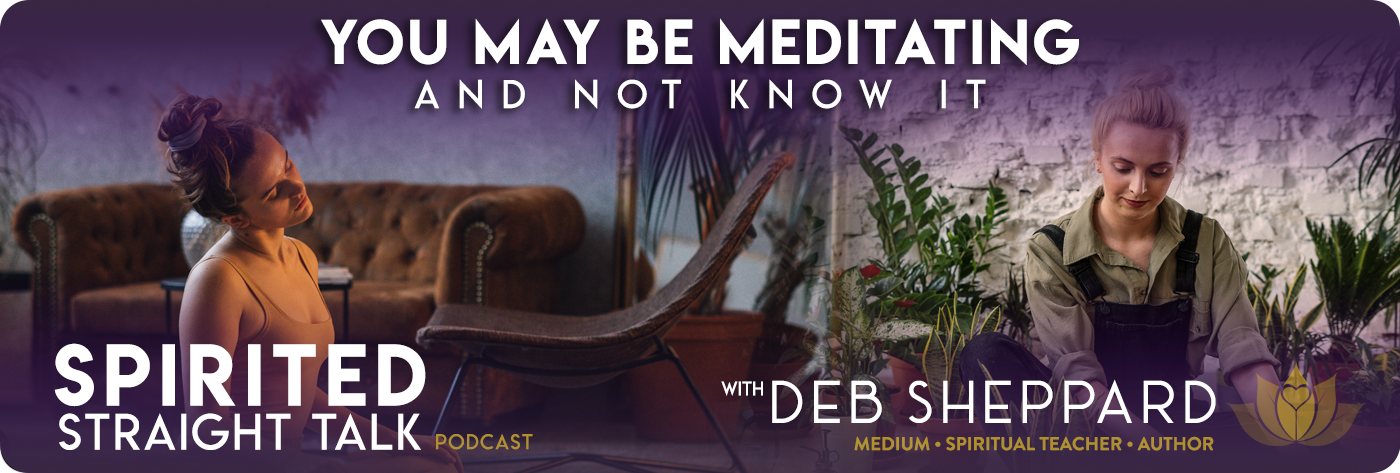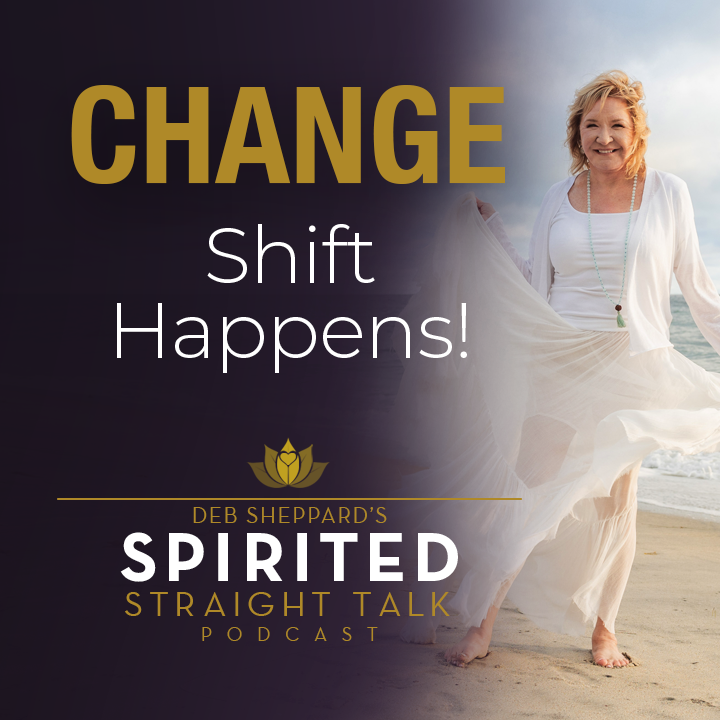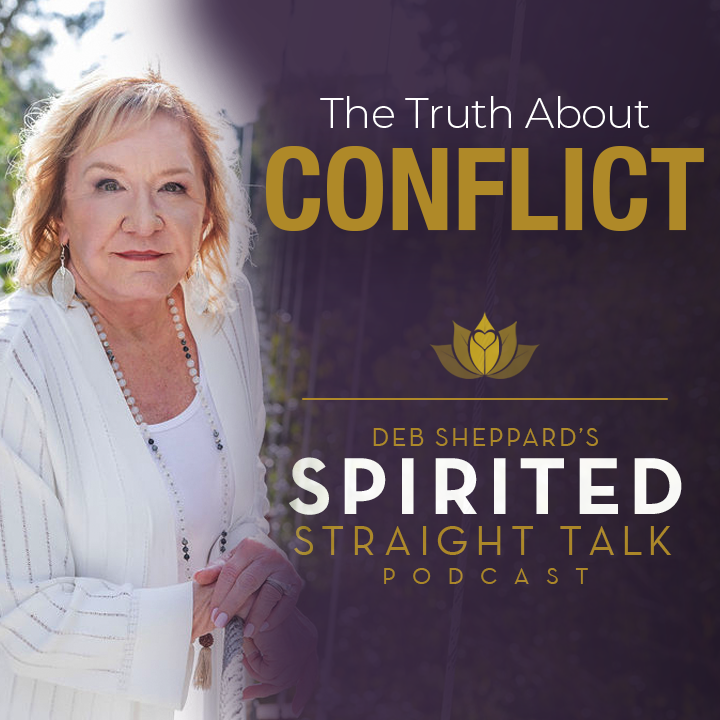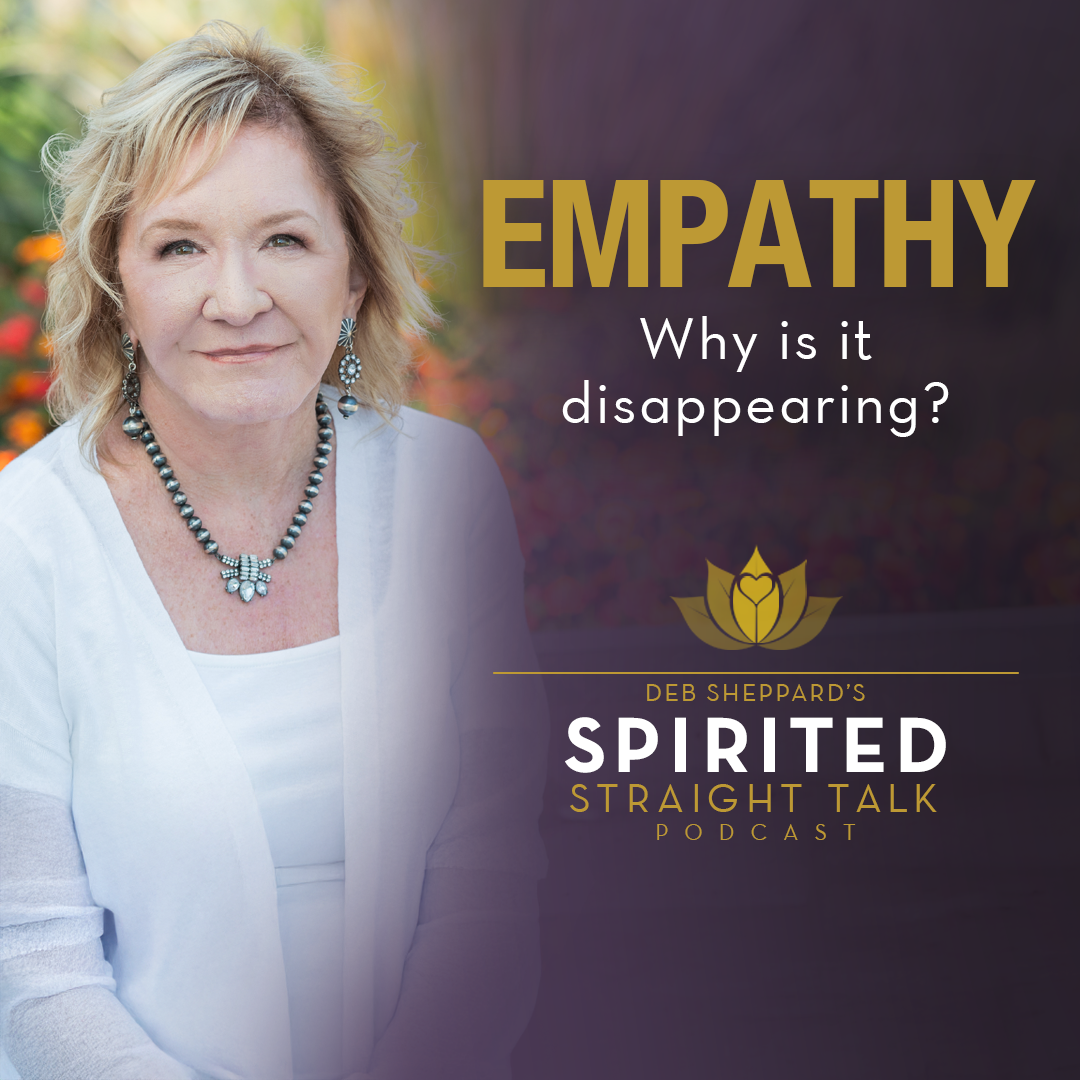
You May Be Meditating and Not Know It.
Deb (6s):
Welcome. I’m Deb Sheppard. I’m your host of Spirited Straight Talk. Thank you for joining me on this amazing and spiritual journey that we call life your in the right place. And you didn’t land here by accident. My intention is to help you learn to free yourself, of things that are holding you back and create a life that truly makes your soul happy. I’ll be talking about key insights and interesting topics to help you learn how to powerfully co-create with the universe. I will cover everything from turning your setbacks into triumphs. My favorite, living your souls purpose. Of course, I’ll be connecting you with spirit, your guides, and the favorite one of course, is your loved ones. On the other side, if you’re ready to truly stop spinning circles and your ready to harness the power to co create an authentic life with spirit, then I hope you join me every week for Spirited straight talk Today.
Deb (1m 1s):
Our topic is something that I discuss a lot and we’ve talked about it. It’s about meditations, and it seems like people get this idea that we’re supposed to be sitting in this quiet room with our legs crossed and our, our hands on our lap Lotus position yet with her middle finger and thumb touching each other saying, oh, you know, and that is a great form of meditation. And I feel that the people that are able to number one, sit in that position for a long period of time, which I cant, it’s really hard, more power to them are people that have practiced that their entire lives. And we do have some friends that practice meditation that way.
Deb (1m 42s):
And I always say, if someone can do that and not have any chatter, because that’s the biggest thing is people go, well, I try to be quiet in my mind, still chattering. So we’re going to put more understanding around that. That’s a myth that here, nothing can be almost impossible unless you’ve done this practice from early on and you’re not being distracted and you don’t have any technology and things like that around you or a problem in your back or your siatica while you’re sitting there. Everything is workable. So for us that are having the normal, hectic, everyday lives. It might look a little differently,
Dana (2m 17s):
but then the kids and the dogs, and the barking
Deb (2m 21s):
yes, the phone ringing and those, all the other commitments that we have. But what we want to understand is the purpose also also of meditation is to really be present. I think what a lot of people envision is that they’re always going to get all this wisdom from the universe. Like, you know, where does this come from? What does this look like? And what I think is that we get into a lot of fear and meditation helps us handle an issue or a situation. And the more we do it, we can calm ourselves so that we can manage something to know how to respond. And I also feel like we get really caught up in our mind when there’s a problem or something that we want to change.
Deb (3m 4s):
We continue to regurgitate that information, which doesn’t really help us, or we ask other friends what they think. And then we add to that. So Meditation is really a form of listening and not looking at your past and not having fear of the future.
Dana (3m 20s):
More looking inside yourself.
Deb (3m 22s):
How do you feel?
Dana (3m 23s):
Or sitting with it yourself basically,
Deb (3m 26s):
And no matter what you believe in. So the purpose of meditation, prayer, your intention of holding that idea, it’s just about being present. And so people that pray is a very similar thing about meditation. They’re just a different form. Prayer is asking that way and then Meditation is about receiving. So they’re very similar. They’re just different words.
Dana (3m 47s):
Well, we talk about the rosary versus the Mala beads,
Deb (3m 52s):
correct
Dana (3m 52s):
both pair beads, both intended for focusing meditation, intention, intention. There may be a different word for it, depending on your religion or belief system, but it is the same thing, essentially, right? The mantra,
Deb (4m 11s):
The prayer beads that are used have, are half of what the Mala beads are. And they both have stones. They both are in a circle and both of them have little things at the end of them. And the malas that we use are, have certain stones too, and they are 102 hundred,
Dana (4m 31s):
108.
Deb (4m 32s):
Thank you. That’s why she’s here too. And you will say certain mantras in order to create a vibration or energy
Dana (4m 42s):
And the 108 holds a humongous symbolism. There’s probably 50 different reasons. There’s 108 beads, but they’re all from the spiritual aspect.
Deb (4m 51s):
Correct. And what we love about them too, is it creates a focus because when you can focus on something, it allows you to be in that present moment. And by saying in those types of meditations, you’re saying the same thing over and over and over again, and that allows your energy to calm down or recognize what you’re looking for. And for both purposes, you’re looking for answers from your higher consciousness or the whatever you believe in, whatever the Buddha, whatever that that is that you believe because our needs for everybody are the same, no matter where you believe or where you live or what you believe, we all have the same needs.
Deb (5m 31s):
And so these are again, forms to get out of the hurricane basically. Cause we get into that whole cycle of confusion and trying to solve problems. And we just want the right answer and the answers may be different for each person. And that’s why being quiet and paying attention can be so helpful and taking the fear out of it. Yeah. So one of the things that’s helpful for is let’s say you’re at work and there’s been a, a difficult situation or you’re having a relationship challenge. And you’re trying to figure out what to say. And I don’t know about you, but you know me, I can put my foot in my mouth so many times.
Deb (6m 11s):
And it’s a, it’s a good time to sit back and go, wait a minute. I need to think about this. I call it marinating. I need to sit back before I respond. And that has to do with age. I think too, is that always having that knee jerk reaction,
Dana (6m 24s):
I would venture to guess that it is a learned thing, but I think also some for you, I know you really need to, to figure out how you want to respond and you always come to the right answer. You know, and, and something I need to learn is to learn, to wait a little bit before I respond, where I am,
Deb (6m 48s):
I’m older than her. That’s what she’s trying to say.
Dana (6m 51s):
And I hope to gain that as I grow up,
Deb (6m 55s):
We do we, we’re in a society that is very quick to respond. We want everything, the answers right away. We’re not willing to wait for it. And that’s, what’s happened to us as a society. Just give me the answer. I just want to know.
Dana (7m 8s):
I think some people are aware differently too. Like I’d rather not worry about it for a long time. I’d rather figure out the answer and not have it weigh on me where I know you like to marinate on it and, and allow yourself the time to respond. So it’s yeah.
Deb (7m 28s):
Well, I let you do all the worry stuff, you know, you have to worry about those things.
Dana (7m 33s):
Well, aren’t you a lucky one
Deb (7m 35s):
Basically, it’s how you’re wired. So if you’re a person that always responds quickly and it’s not working for you, then it would be a great suggestion to figure out how to meditate for yourself. Yeah. And that you can get more clarity and perhaps see more sides of the equation. Because a lot of times we see our own personal side and we don’t see the bigger picture. And if you’re a problem solver, there are many times that you want to solve someone else’s issues or problems, and it’s much easier to solve theirs than ours. Right. And that sometimes means maybe we need to get out of the way. Yeah. You know, if they haven’t asked us and you know, I talk about this all the time is there’s boundaries. Sometimes it’s not your job to fix the problem.
Dana (8m 17s):
Right.
Deb (8m 18s):
And that could be the answer that is important to hear. I think a lot of times we get into the fear, well, this happened in the past, so I don’t want this to happen again. And that’s where we start doing something maybe different than we did before, but we still don’t have all the clarity in order to approach the situation still in a good way. So,
Dana (8m 40s):
So ultimately what you’re saying is meditation, you can use it to marinate, but you can also use it to calm yourself and just open yourself up to whatever you’re supposed to receive.
Deb (8m 55s):
Yeah. And For me, I am very sensitive. So if I get a lot of people’s energy, that’s negative, I need to walk away and figure things out because otherwise I’m going to again, react a certain way. So it is a great way to take some deep breaths, you know, go into the restroom. If you can wash your hands, which everyone’s been doing a lot of these days washing their hands.
Dana (9m 17s):
Well, cause water, water actually helps clear away emotion.
Deb (9m 22s):
Correct.
Dana (9m 23s):
So when you say wash your hands or take a shower or take a bath, it’s because water actually helps wash some of that energy away.
Deb (9m 32s):
If you think about it, we were born in water. Yeah. So that’s a very comforting, safe place to feel. And it’s by using the intention that I’m, you know, releasing all these emotions and feelings so that you can get clarity. And Meditation is just about getting clarity. It’s taking yourself out of a situation and getting a different response than what you would normally do. And I think what people think is they have to do these really long meditations. Like I get to spend 40 minutes to an hour meditating and most people don’t have that kind of time. And so one of the things I teach is doing those quick meditation. So you can do them more daily as well as if there’s a situation and you need to walk away and think about it.
Deb (10m 15s):
You’ve got some quick tools which we’re going to give you
Dana (10m 18s):
suggestions.
Deb (10m 19s):
Yeah. And the other thing is people think that their chatter in their mind, I know we talked about this earlier, but the chatter in their mind doesn’t go away. It’s not going to go away. Our brains are wired to continue getting the information. And so what you want to be able to do is have the chatter, not arguing with you anymore, or defending yourself or replaying the story versus calming it down so that you can get rational. And some of the ways I, I share this how to do this is when we, you know, me, I’m always forgetting someone’s name. You know, who was that actor in that movie that I can’t remember. And then Dana won’t remember, we’ll Google, but oftentimes you’ll walk away.
Deb (10m 59s):
And you remember that person’s name. I know that I’ve met somebody like you see them out shopping and you know them, but it’s not in the content of being at the grocery store and it’s that. And then 20 minutes later, you remember it connected and that’s what meditation does. It, it helps you refocus and get some answers because you’re not in that hectic space.
Dana (11m 22s):
Well, and I remember learning this a long time ago, probably in some biology class, but that your, your brain holds all this information too. And allowing yourself to relax, allows the information to flow. So I’m assuming from your perspective, from a spiritual aspect, it’s the same thing,
Deb (11m 41s):
correct
Dana (11m 41s):
allowing your mind to relax, allows that connection to flow as well from a spiritualist.
Deb (11m 49s):
And just so you know, when you get the answers, you need, it, won’t be in someone else’s voice. People go like I’m not hearing them. I’m like, well, if you heard someone else’s voice would probably freak you out. So it will sound like your voice or those, they care, thoughts, thoughts. And that’s where I think people get confused, but you’re getting different solutions to it. And you’re getting more wisdom and it might be something simple as you hear a song or you remember a story or you remember someone else going through the same scenario and that will pop in to go, oh yeah, that’s right. That’s how I need to remember. And I think when our bodies are stiff, you know, when you meet somebody and they, they’re not breathing very much and their readings are short and their body’s tense, it’s very hard to hear what they’re saying.
Deb (12m 34s):
And so that’s the energy too. You want to make sure that your body is relaxing so you can hear the information yourself. I think too, what we have to learn in meditation or doing these things is trying to have the feeling that you’re in a good place. Because usually when we, if you, if you practice, this is maybe go back this way. When you go in and you do this more daily, which will give you some, some examples, it will be a more natural process versus trying to figure it out. When you’re hitting the panic button, all I need to have answers. So there may be days that you are meditating and you do these quick things where you just tune in to know, it’s like finding a memory, like how we’ve gone to the ocean.
Deb (13m 16s):
You can go back through you remember that story, and it makes you feel relaxed. Or do you remember this? So having the form of meditation on a regular basis allows you to go to that feeling to relax so you can deal and manage with life.
Dana (13m 30s):
So I think a lot of people are meditating and they don’t even realize it.
Deb (13m 33s):
Yes.
Dana (13m 34s):
So they, you know, when, when we were talking about this podcast, some of the things you shared is it it’s almost like, oh, okay. So that was me meditating basically, because I was present in that moment. And I wasn’t, you know, my Mo I just kind of let my mind wander. Maybe like, for me, it’s letting my mind wander versus trying to figure out what’s next on my to-do list. So that’s my differentiation between the two things I think,
Deb (14m 10s):
Well, you know, I play solitaire on my phone sometimes and that’s for me to distract myself from the present. And I think the other thing is people think that when they meditate, they should get the answers right then. And that would be, it can work that way with practice. You can start getting information. But what I find for most people, including myself, is I may get some information or feel it. I’m not quite sure, but as the day goes on or the week goes on, I start getting validation about the answer that I was feeling or the answers that I need or the direction. And that’s really the beauty of it is when you do that type of form of meditation and you don’t get the answers, but you know, it’s like you open up this little door and the universe goes, how about this?
Deb (14m 56s):
And how bout that. And you go, I was just thinking about that the other day, or you hear a commercial or you watch a movie and we’ve done that so many times, like right now we’re reading that book and it’s just these ahas of information. And it’s because it comes in different forms. And that’s what we want to be open to is that they’re going to give you the answer. It just may not be in the form of when you’re meditating and you know,
Dana (15m 20s):
it’s daydreaming.
Deb (15m 22s):
Yeah. So how many have kids, or how about how many times do you in a corporate meeting? And you’re like, don’t want to be there, but you’re thinking about something else. And you’re looking out the window
Dana (15m 34s):
every time I was ever in a corporate meeting
Deb (15m 38s):
or kids are like, they’re looking out the window going, oh yeah. And the teacher or the boss, or whoever says, you know, is everyone getting that? Or do you understand? And you’re like, oh, where was I? That’s actually a form of meditation. Because even though you’re present, you’re, you’re out there somewhere else, your body feels relaxed. Your mind is relaxed. You’re just in a whole better place because right. Where you are, is not where you want to be. Right. So yes, all those daydreams that you do is a connection with you. We’re actually meditating. So, you know, what people can do is just go to corporate meetings
Dana (16m 11s):
and corporate meetings daydream. I don’t wish that upon anyone
Deb (16m 17s):
that could be the holes for a meditation. Well, you remember Ferris Bueller’s day off. That was when they were all the kids were like sleeping and not their class in class. Yeah. That’s probably the form of meditation.
Dana (16m 28s):
That’s funny.
Deb (16m 29s):
The other thing too is if we have to realize that when you’re meditating, praying, whatever that looks like, it is not always the logical thing. It will use your imagination. So if you’re a person that is very black and white, very analytical, purposeful to do lists a type, a personality, you’re going to have to kind of wiggle around a little bit and allow yourself to use your imagination and maybe not get the direction that you were thinking. And I always say to people, you know, if you keep doing the same thing over and over, you’re going to get the same results. So it’s trying something new. And I would rather teach people how to get their own answers and listen, versus always having to seek out someone for answers.
Deb (17m 11s):
And we were born with intuition. We were born being able to do this. We just got through life where we were told by community. This is how you have to live. And this is how you have to think, and this is how you have to work. And this is how you have to be in a relationship. So we shut that off. And what you’re doing is
Dana (17m 28s):
we were pretty much told how to behave right. Our entire lives. So yeah.
Deb (17m 33s):
So sense. What you’re doing is you’re reactivating that intuition again. So it’s always been there. You just turned off the light switch, you know, how kids and animals, they know when there’s fear. They know when something isn’t right. Things like that. So it’s always been there. So now you’re reactivating it, so it’s not scary. People go, well, what if I hear something I don’t want to hear?
Dana (17m 53s):
I don’t know if that’s possible. I Mean,
Deb (17m 55s):
well, I think people think that they’re going to hear bad news, even coming to someone like myself. And it’s like, no, you know, w we were told by if
Dana (18m 3s):
It’s a good somebody like you.
Deb (18m 6s):
Yeah. But even if you go to the doctor and they’re saying, Hey, you need to exercise more. I mean, it’s not like that scary. It’s just that that’s part of your health and to keeping that balance, but your guides are really there to give you yeah. You know, the positive things and how to deal with it,
Dana (18m 19s):
the opportunities,
Deb (18m 21s):
The opportunities. So even though we have a meditation room, we don’t go sit on the floor in there and meditate like that.
Dana (18m 27s):
I want To, I want to do that more,
Deb (18m 30s):
But we can’t part of it is creating how you make that space in time. Yeah. But again, you can find other ways to do it. We have one student that recently, she just said, I just realize I always meditate in the shower because I get all my information. Remember, there’s no technology, no one bothered me. You’ve got that quiet space. So definitely make those intentions surrounded by water, surrounded by water. Again, just imagine all your body and your energy being cleansed and just listen and breathe in and feel that of course, coloring the dollar’s or adult coloring books that are not X-rated.
Dana (19m 3s):
Well, some of them probably are right.
Deb (19m 6s):
And people laugh because you know this, when I blow dry my hair, I get a lot of information or walk. And because I’m just sitting there and I’m focused and I’m looking at what I need to do. And I get out, start writing down things. And not too long ago, we were doing this class and I gave you the idea and you’re like, Hmm, I’m not really sure. I was like, fine. And I went and blew dry my hair. And my guides came through with what to do. The assignment ended up being great. So it is allowing yourself to see things more possible. And it actually is easier because they can help you with the answers.
Dana (19m 42s):
Hmm. Well, I like that. Not having to think as much, just give me the answers.
Deb (19m 48s):
just give me the answers. Of course, being outdoors, playing music. I even wrote down, if you have animals, like brush your dog, you know, play with your cat, those things are just being present in animals, have such unconditional love. There’s just that good feeling. And I think that can help people be present.
Dana (20m 4s):
Yeah. You can change your energy just by petting an animal. Yeah,
Deb (20m 7s):
Absolutely. And then in water, hot Epsom salt, baths, paintings, swimming, any of those things, but they’re
Dana (20m 14s):
exercise for me is like going for a run or swimming, or probably not biking as much because I do guided biking on Peloton, but there are certain, certain forms of exercise that are
Deb (20m 29s):
not me. Yeah.
Dana (20m 31s):
Yes. Yeah.
Deb (20m 32s):
When I’m walking, I can get a lot of information. Yeah. But Dana is dragging me behind her, like come on.
Dana (20m 38s):
Yeah. But you do it and you still get info when you exercise.
Deb (20m 42s):
Yes, I do. Yeah. I’m just telling her no. So if You really want to have meditation look differently in certain times to find a deeper form of it. Of course, there’s always the guided meditations, which ive done For years
Dana (20m 59s):
you do a lot of those in your classes and to help your students through their or to basically to take them where you want them to go in their thought process. So you do guided meditations
Deb (21m 10s):
And they’ll go, well, I didn’t go there and went somewhere else. I’m like, sweet. That’s really great. You want to go wherever you need to go. It’s just, it’s just bringing that energy in so that people can allow themselves to go along the journey. Yoga. The other thing is candle gazing. And that is basically lighting a candle and having the room not too dark, but dark enough where you can just look at that flame and relax and breathe into it. And, and, and that doesn’t have to take very long. I used to do it when there was in the bath, taking Epsom salt baths and putting my candles there, the gong bath, which I have done several times for people, you know, that big gong and those are fun. It’s a whole different type of vibration energy.
Dana (21m 49s):
Yeah. Yeah. It’s a sound meditation, which is incredible, but it’s sound in a vibrating form. So you actually feel the waves from the garden.
Deb (22m 3s):
And then the other one is we have singing bowls. So if people haven’t purchased one of those, get one of those in place, a singing bowl, but you can do automatic writing, which is just putting the pen to paper and writing what comes through listening to music. I would say having fun and joy is a great form of meditation. So anyway, these are just some great ideas. Just start even going there.
Dana (22m 23s):
I venture to guess most people have done many of these and had thoughts going through their mind and they were actually meditating and didn’t even realize it.
Deb (22m 34s):
Right. And that was my point to say, is that when you are going to, let’s say, take a shower or this hot bath though, in like, this is my meditation, I’m going to be present. And that can be in your everyday life. And if you crochet or do those kinds of hobbies too, they can actually be part of that too. Cause you’re, you’re just being present and you’re focused in that timeframe and have fun with it. And don’t try to make it more difficult because it’s, it’s a very natural process. It’s just practicing and acknowledging it. And then taking any notes that you get throughout that day or week. That was, oh yeah. that makes total sense
Dana (23m 13s):
I think that’s the important piece is if you’re asking a question or you’re needing guidance, have a pen and paper ready because it will come, it’s going to come through to you.
Deb (23m 25s):
And what I love about doing this kind of work is we have a goal of mine. Like, look, we’re going to teach us, are going to do this. And then I start meditating on how it can look. And my guides come through with some great information. And I love it because when I’m teaching the class that people will say, we were all thinking about that. You know, this is what I, where I was. So that helps you align yourself with the people you’re working with your family and what you need to. So it’s a great practice and it’s been around for thousands of years. So thanks again for joining us on Spirited Straight Talk.
Dana (24m 1s):
Thank you so much for listening to the show. Each Monday is a new episode of Spirited Straight Talk, make sure you hit follow. So you don’t miss any of the guidance or bonus episodes. Your experience at the show means a lot to us, and we would love for you to leave a review or let us know about more topics you would like to explore. You can also follow Deb on social media and connect with our website at DebSheppard.com. That’s Deb S H E P P a R d.com. If you want to join Deb on one of the shows or have a reading from her on the show, you can submit a request on the podcast page of her website. Thank you again and see you next week.




